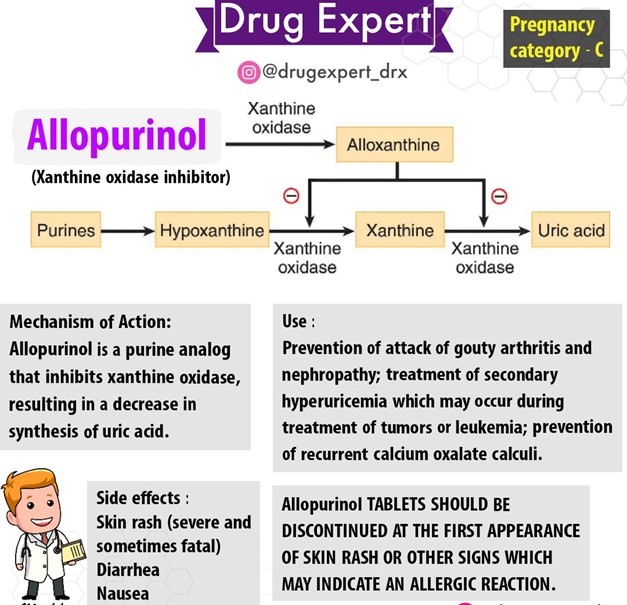A nurse in a mental health unit asks a client who has schizophrenia, "How are you?" Which of the following responses should the nurse identify as the speech alteration of echolalia?
"I am lovistrated."
"Super, trooper, and duper."
"How are you?"
"Pink spots in Africa."
The Correct Answer is C
Echolalia is the repetition of words or phrases spoken by others. In this case, the client is repeating the nurse's question, "How are you?" This is an example of echolalia.
a) "I am lovistrated" is an example of neologism, which is the creation of new words.
b) "Super, trooper, and duper" is an example of clang association, which is the use of words that sound alike but have no logical connection.
d) "Pink spots in Africa" is an example of a thought disorder, which is a disruption in the organization and expression of thoughts.
Nursing Test Bank
Naxlex Comprehensive Predictor Exams
Related Questions
Correct Answer is D
Explanation
When taking allopurinol, a medication commonly used to treat gout and prevent kidney stones, the nurse should instruct the client to monitor and report the manifestation of a skin rash with fever. Stevens-Johnson syndrome (SJS) is a severe and potentially life-threatening condition that can occur as a rare side effect of allopurinol. It is characterized by a widespread rash, often with fever, and can progress to involve the mucous membranes (e.g., mouth, eyes) and cause severe complications.
The other manifestations mentioned, such as diplopia (double vision), tinnitus with ear pain, and hyperreflexia (exaggerated reflexes), are not typically associated with Stevens-Johnson syndrome and should not be directly attributed to this condition. However, it's important for the client to report any unusual or severe symptoms to their healthcare provider for further evaluation and appropriate management.

Correct Answer is D
Explanation
Grapes are a common choking hazard for young children, especially toddlers, due to their small size, round shape, and slippery texture. The size and shape of grapes can block the airway and pose a significant risk if not properly cut or prepared before being given to a toddler. It is recommended to cut grapes into small pieces or slice them lengthwise to reduce the risk of choking.
While potatoes, corn, and oranges can also pose a choking risk if not properly prepared or cut into age-appropriate sizes, they are not as commonly associated with choking incidents in toddlers as grapes are. Nonetheless, it is essential for parents and caregivers to be aware of appropriate food preparation techniques and supervise children during meals to ensure their safety.
Whether you are a student looking to ace your exams or a practicing nurse seeking to enhance your expertise , our nursing education contents will empower you with the confidence and competence to make a difference in the lives of patients and become a respected leader in the healthcare field.
Visit Naxlex, invest in your future and unlock endless possibilities with our unparalleled nursing education contents today
Report Wrong Answer on the Current Question
Do you disagree with the answer? If yes, what is your expected answer? Explain.
Kindly be descriptive with the issue you are facing.
